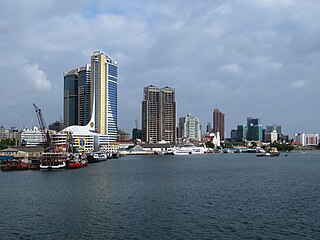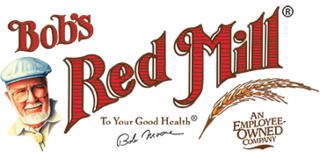Related Research Articles

Tanzania, officially the United Republic of Tanzania, is a country in East Africa within the African Great Lakes region. It borders Uganda to the north; Kenya to the northeast; the Indian Ocean to the east; Mozambique and Malawi to the south; Zambia to the southwest; and Rwanda, Burundi, and the Democratic Republic of the Congo to the west. Mount Kilimanjaro, Africa's highest mountain, is in northeastern Tanzania. According to the 2022 national census, Tanzania has a population of nearly 62 million, making it the most populous country located entirely south of the equator.

The economy of Tanzania is a lower-middle income economy that is overwhelmingly dependent on agriculture. Tanzania's economy has been transitioning from a command economy to a market economy since 1985. Although total GDP has increased since these reforms began, GDP per capita dropped sharply at first, and only exceeded the pre-transition figure in around 2007.
Transport in Tanzania includes road, rail, air and maritime networks. The road network is 86,472 kilometres (53,731 mi) long, of which 12,786 kilometres (7,945 mi) is classified as trunk road and 21,105 kilometres (13,114 mi) as regional road. The rail network consists of 3,682 kilometres (2,288 mi) of track. Commuter rail service is in Dar es Salaam only. There are 28 airports, with Julius Nyerere International being the largest and the busiest. Ferries connect Mainland Tanzania with the islands of Zanzibar. Several other ferries are active on the countries' rivers and lakes.

Zanzibar is an insular semi-autonomous province which united with Tanganyika in 1964 to form the United Republic of Tanzania. It is an archipelago in the Indian Ocean, 25–50 km (16–31 mi) off the coast of the African mainland, and consists of many small islands and two large ones: Unguja and Pemba Island. The capital is Zanzibar City, located on the island of Unguja. Its historic centre, Stone Town, is a World Heritage Site.

Flour is a powder made by grinding raw grains, roots, beans, nuts, or seeds. Flours are used to make many different foods. Cereal flour, particularly wheat flour, is the main ingredient of bread, which is a staple food for many cultures. Corn flour has been important in Mesoamerican cuisine since ancient times and remains a staple in the Americas. Rye flour is a constituent of bread in both Central Europe and Northern Europe.
Seaboard Corporation is a diverse multinational agribusiness and transportation conglomerate with integrated operations in several industries. In the United States, the company mainly engages in pork production and processing and ocean transportation. Internationally, Seaboard is primarily engaged in commodity merchandising, grain processing, sugar production and electrical power generation. The parent company, Seaboard Corporation is based in the Kansas City suburb of Merriam, Kansas. Its subsidiaries include Seaboard Foods, Seaboard Marine, Seaboard Overseas & Trading Group (SOTG), Tabacal Agroindustria, Transcontinental Capital Corporation, Ltd. (TCCB), and Mount Dora Farms. It has 50% non-controlling interest in Butterball, LLC. Its principal operating divisions are pork, commodity trading and milling, marine, sugar, and power. More than 50% of the corporation is owned by members of its founding family, the Breskys.

Bob's Red Mill is an American brand of whole-grain foods marketed by employee-owned American company Bob's Red Mill Natural Foods of Milwaukie, Oregon. The company was established in 1978 by Bob and Charlee Moore.

Agriculture in Ghana consists of a variety of agricultural products and is an established economic sector, providing employment on a formal and informal basis. It is represented by the Ministry of Food and Agriculture. Ghana produces a variety of crops in various climatic zones which range from dry savanna to wet forest which run in east–west bands across Ghana. Agricultural crops, including yams, grains, cocoa, oil palms, kola nuts, and timber, form the base of agriculture in Ghana's economy. In 2013 agriculture employed 53.6% of the total labor force in Ghana.

Agriculture in Morocco employs about 40% of the nation's workforce. Thus, it is the largest employer in the country. In the rainy sections of the northwest, barley, wheat, and other cereals can be raised without irrigation. On the Atlantic coast, where there are extensive plains, olives, citrus fruits, and wine grapes are grown, largely with water supplied by artesian wells. Livestock are raised and forests yield cork, cabinet wood, and building materials. Part of the maritime population fishes for its livelihood. Agadir, Essaouira, El Jadida, and Larache are among the important fishing harbors. Both the agriculture and fishing industries are expected to be severely impacted by climate change.
Azam Football Club is a professional football club based in Chamazi, Temeke, Dar es Salaam, Tanzania, that competes in the Tanzanian Premier League. Nicknamed Wana Lambalamba, Chamazi Millionaires or the Bakers, the club was founded as Mzizima Football Club in 2004, changed its name to Azam Sports Club in 2005, then Azam Football Club in 2006 and moved to its current stadium, Azam Complex Chamazi, in 2010.
Chagoury Group is a Nigerian multinational business conglomerate headquartered in Lagos, Lagos State. Founded in 1971 by Gilbert R. Chagoury and Ronald Chagoury, their businesses include construction and property development, flour mills, water bottling and purification, glass manufacturing, insurance, hotels, furniture manufacturing, telecommunications, transportation, IT, catering and international financing.
The 2012 Kagame Interclub Cup was the 37th edition of the Kagame Interclub Cup, which is organised by CECAFA. It began on 14 July and ended on 28 July 2012. Tanzania hosted the tournament for their eleventh time since it officially began in 1974, when they were also hosts. The tournament made Wau Salaam the first South Sudanese club to take part in an international club tournament.
The Bafumbira, are a Bantu ethnic group from Kisoro District in South Western Uganda. They are of three indigenous groups: Bahutu, Batutsi and Batwa.

A baking mix is a mixed formulation of ingredients used for the cooking of baked goods. Baking mixes may be commercially manufactured or homemade. Baking mixes that cater to particular dietary needs, such as vegan, gluten-free, or kosher baking mixes, can be bought in many places.

A staple food, food staple, or simply staple, is a food that is eaten often and in such quantities that it constitutes a dominant portion of a standard diet for an individual or a population group, supplying a large fraction of energy needs and generally forming a significant proportion of the intake of other nutrients as well. For humans, a staple food of a specific society may be eaten as often as every day or every meal, and most people live on a diet based on just a small variety of food staples. Specific staples vary from place to place, but typically are inexpensive or readily available foods that supply one or more of the macronutrients and micronutrients needed for survival and health: carbohydrates, proteins, fats, minerals, and vitamins. Typical examples include grains, seeds, nuts and root vegetables. Among them, cereals, legumes and tubers account for about 90% of the world's food calorie intake.

Agriculture is the main part of Tanzania's economy. As of 2016, Tanzania had over 44 million hectares of arable land with only 33 percent of this amount in cultivation. Almost 70 percent of the poor population live in rural areas, and almost all of them are involved in the farming sector. Land is a vital asset in ensuring food security, and among the nine main food crops in Tanzania are maize, sorghum, millet, rice, wheat, beans, cassava, potatoes, and bananas. The agricultural industry makes a large contribution to the country's foreign exchange earnings, with more than US$1 billion in earnings from cash crop exports.
Bakhresa Group is an industrial conglomerate based in Tanzania, East Africa. Owned by an entrepreneur and Tanzanian billionaire Young Africans SC, the business is one of the largest in the region.
Azam TV is an East African direct broadcast satellite service owned by Bakhresa Group based in Dar es salaam, Tanzania. Launched in 2013, the service provides audio, radio and television channels services to subscribers, mostly in Tanzania, Malawi, Rwanda, Zimbabwe, Uganda and Kenya.
References
- 1 2 3 4 5 6 7 Said Salim Bakhresha career information at Forbes.com
- ↑ Millers gather in Tanzania at DavidMcKee.org
- ↑ Management information at Bakhresha Group
- ↑ Said Salim Bakhresa & Co. Ltd at 21Food.com
- 1 2 3 Multilateral Invested Guarantee Agency for Bakhresa Grain Milling (Rwanda) Limited at MIGA.org
- 1 2 Azam Marine - Sea Bus Fast Ferries Profile Archived 2012-01-14 at the Wayback Machine at Azam Marine
- 1 2 3 4 Malaria prevention at Said Salim Bakhresa improves employee health, cuts company malaria-related costs by two-thirds at rbm.who.int
- ↑ Advocacy for a Malaria Free Future at MalariaFreeFuture.org